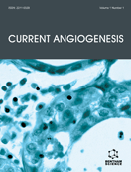Abstract
Angiogenesis is the growth and proliferation of blood vessels from existing vascular structures deputed to repair injured endothelium.
Both unselected bone marrow-derived mononuclear cells, which include stem/progenitor cells and several other cell types, and endothelial progenitor cells (EPCs), a subpopulation, show regenerative potential in ischemic injured tissue. In addition, evidence supports both the involvement of EPCs in capillary growth and EPCs participation in the formation of collateral vessels.
Accumulating evidence indicates specifically that EPCs derived from bone marrow contribute to reendothelialization of injured vessels as well as neo-vascularization of ischemic lesions. Moreover, the number and/or the functional activity of EPCs inversely correlate with risk factors of cardiovascular disease. Among the different risk factors, cigarette smoking is a major cause of reducing the numbers and function of circulating EPCs as several reports seem to demonstrate. Nicotine plays a strong role in damaging EPCs preparing the following action of carbon monoxide on altered endothelial cells not protected by EPC activity.
Keywords: Angiogenesis, endothelial progenitor cells, smoking.
 5
5

